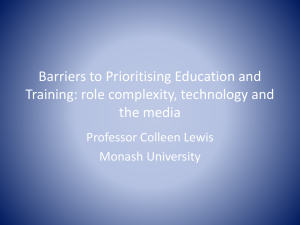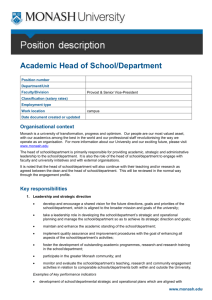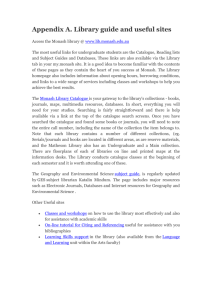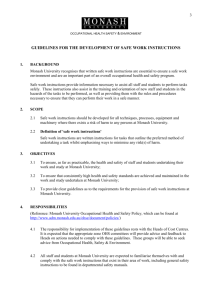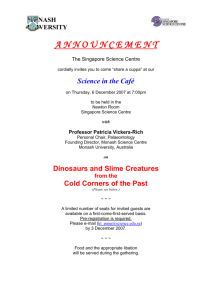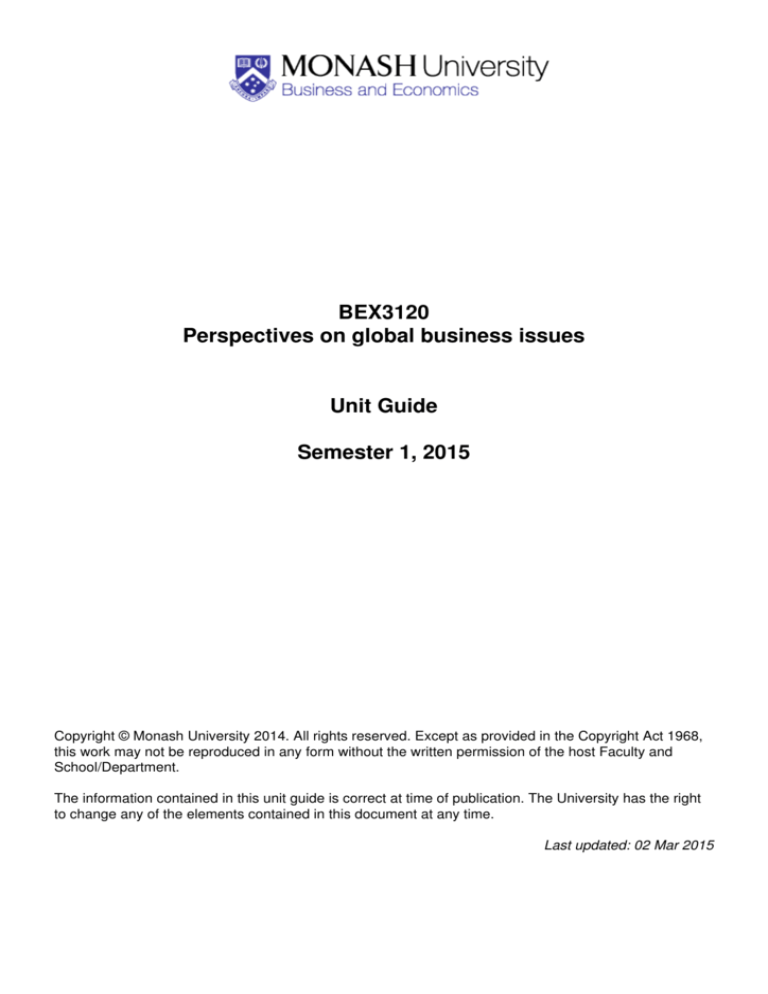
BEX3120
Perspectives on global business issues
Unit Guide
Semester 1, 2015
Copyright © Monash University 2014. All rights reserved. Except as provided in the Copyright Act 1968,
this work may not be reproduced in any form without the written permission of the host Faculty and
School/Department.
The information contained in this unit guide is correct at time of publication. The University has the right
to change any of the elements contained in this document at any time.
Last updated: 02 Mar 2015
Table of Contents
BEX3120 Perspectives on global business issues - Semester 1, 2015................................................1
Mode of Delivery..............................................................................................................................1
Workload requirements....................................................................................................................1
Unit Relationships............................................................................................................................1
Prerequisites........................................................................................................................1
Chief Examiner(s)........................................................................................................................................1
Campus Lecturer(s).....................................................................................................................................1
Malaysia...........................................................................................................................................1
Tutor(s)........................................................................................................................................................2
Malaysia...........................................................................................................................................2
Your feedback to Us....................................................................................................................................2
Previous Student Evaluations of this Unit....................................................................................................2
Academic Overview...................................................................................................................................3
Learning Outcomes.........................................................................................................................3
Unit Schedule.............................................................................................................................................4
Teaching Approach..........................................................................................................................4
Assessment Summary.....................................................................................................................4
Second marking...................................................................................................................5
Return of final marks............................................................................................................5
Exam viewing.......................................................................................................................5
Assessment criteria..............................................................................................................5
Assessment Requirements......................................................................................................................6
Assessment Tasks...........................................................................................................................6
Assessment task 1...............................................................................................................6
Assessment task 2...............................................................................................................7
Examination(s).............................................................................................................................................8
Examination 1..................................................................................................................................8
Learning resources......................................................................................................................................8
Feedback to you..........................................................................................................................................8
Extensions and penalties.............................................................................................................................8
Returning assignments................................................................................................................................9
Resubmission of assignments.....................................................................................................................9
Referencing requirements...........................................................................................................................9
Assignment submission...............................................................................................................................9
Hard copy submission.....................................................................................................................9
Online submission...........................................................................................................................9
Required Resources....................................................................................................................................9
Prescribed text(s) and readings.......................................................................................................9
Technological Requirements.....................................................................................................................10
Other Information....................................................................................................................................11
Policies..........................................................................................................................................11
Graduate Attributes Policy.................................................................................................11
Student Charter.........................................................................................................................................11
Student services........................................................................................................................................11
Monash University Library.........................................................................................................................11
Moodle 2....................................................................................................................................................11
Disability Liaison Unit................................................................................................................................12
BEX3120 Perspectives on global business issues - Semester 1,
2015
In an increasingly globalised world the ability to recognise and reflect on how various global issues affect
businesses is of considerable importance. Similarly, cooperation and teamwork skills that involve people
from different locations and backgrounds are of particular use to many organisations. This unit focuses
on developing these abilities and skills, addressing various global issues and how they affect business,
as well as aspects of global citizenship, cultural sensitivity and effective teamwork. The unit includes
extensive supervised teamwork in which students complete tasks by working in teams across Monash
campuses.
Mode of Delivery
Malaysia (Day)
Workload requirements
Minimum total expected workload to achieve the learning outcomes for this unit is 144 hours per
semester typically comprising a mixture of scheduled learning activities and independent study.
Independent study may include associated readings, assessment and preparation for scheduled
activities. The unit requires on average three/four hours of scheduled activities per week. Scheduled
activities may include a combination of teacher directed learning, peer directed learning and online
engagement.
See also Unit timetable information
Unit Relationships
Prerequisites
Students must have completed the six compulsory core units (or equivalent), four 2nd level units and two
3rd level units.
Chief Examiner(s)
Ms Shanthy Rachagan
Campus Lecturer(s)
Malaysia
Dr Tee Ding Ding
Contact hours: As communicated in class and via e-mail
1
BEX3120 Perspectives on global business issues - Semester 1, 2015
Tutor(s)
Malaysia
Dr Tee Ding Ding
Contact hours: As communicated in class and via e-mail
Your feedback to Us
Monash is committed to excellence in education and regularly seeks feedback from students, employers
and staff. One of the key formal ways students have to provide feedback is through the Student
Evaluation of Teaching and Units (SETU) survey. The University’s student evaluation policy requires that
every unit is evaluated each year. Students are strongly encouraged to complete the surveys. The
feedback is anonymous and provides the Faculty with evidence of aspects that students are satisfied
and areas for improvement.
For more information on Monash’s educational strategy, see:
www.monash.edu.au/about/monash-directions/ and on student evaluations, see:
www.policy.monash.edu/policy-bank/academic/education/quality/student-evaluation-policy.html
Previous Student Evaluations of this Unit
This is a new unit. Past evaluation not available.
If you wish to view how previous students rated this unit, please go to
https://emuapps.monash.edu.au/unitevaluations/index.jsp
2
Academic Overview
Learning Outcomes
The learning goals associated with this unit are to:
1. recognise global issues and assess their impact on business
2. critically reflect on how an individual's cultural context influences his/her perspective of an
identified global business issue
3. develop communication skills while working cooperatively and collaboratively with students in
other global locations
4. propose creative solutions to business issues integrating prior knowledge gained in the degree.
3
Unit Schedule
Week
Activities
0
Assessment
No formal assessment or activities are
undertaken in week 0
1
Unit overview and introduction
2
Seminar and Business Simulation
3
Seminar and Business Simulation
4
Seminar and Business Simulation
5
Seminar and Business Simulation
6
Seminar and Business Simulation
7
Seminar and Business Simulation
8
Seminar and Business Simulation
9
Seminar and Business Simulation
10
Seminar and Business Simulation
11
Seminar and Business Simulation
Self-reflection Exercise Due ;
Stockholders Final Debrief Due
12
Unit review and exam preparation
Learning Journal: Second Submission
Due
SWOT VAC
No formal assessment is undertaken
SWOT VAC
Examination period
LINK to Assessment Policy:
http://policy.monash.edu.au/policy-bank/
academic/education/assessment/
assessment-in-coursework-policy.html
Simulation Performance Commences
Learning Journal: First Submission Due
Teaching Approach
This unit uses a combination of seminar series and hands-on business simulation to facilitate learning,
practical exploration and peer learning. The seminars explore contemporary global issues in a
multidisciplinary context. It requires self-directed research by students and active learner involvment. The
business simulation exercises provide students an effective platform to explore the complexity of
business decision-making in a dynamic competitive environment. It requires multidisciplinary team
dynamics and integration of prior knowledge into operating a virtual company. Reflection is used in both
teaching approaches to conceptualise the experience.
Assessment Summary
Within semester assessment: 70%
Examination: 30%
Assessment Task
Learning Journal and Self-reflection
Exercises
Value
Learning Journal: 25% ; Self-reflection Exercise:
10%
Due Date
Weeks 2-12
4
Unit Schedule
Group Business Simulation
(6-person group)
Simulation Performance: 20% ; Stockholders
Final Debrief: 15%
Weeks 4-11
Examination 1
30%
To be
advised
Second marking
Where an assessment task is given a fail grade by an examiner, that piece of work will be marked again
by a second examiner who will independently evaluate the work, and consult with the first marker. No
student will be awarded a fail grade for an assessment task or unit without a second examiner confirming
the result.
Note: Exceptions to this are individual pieces of assessment contributing 10% or less of the final mark,
unless the total of such pieces exceeds 30% of the final mark.
Return of final marks
Faculty policy states that 'the final mark that a student receives for a unit will be determined by the Board
of Examiners on the recommendation of the Chief Examiner taking into account all aspects of
assessment'.
The final mark for this unit will be released by the Board of Examiners on the date nominated in the
Faculty Calendar. Student results will be accessible through the my.monash portal.
Exam viewing
Exam sightings for Department of Management units are held no later than 7 days after results have
been published. Students are required to complete and submit a Request to Sight Examination Script
form to the Department of Management. Students can collect this form from the Department of
Management Academic Services Office at their home campus or download it directly from the website:
http://www.buseco.monash.edu.au/mgt/student/exam-sighting.html
Please note:
There is no requirement or obligation that comments will be provided when students view their exam
script.
Please see
http://www.policy.monash.edu/policy-bank/academic/education/assessment/unit-assessment-procedures.html#FFe
Scripts subject to an appeal shall be retained for one month after conclusion of the appeal or six months
after notification of results - whichever is the greater.
Assessment criteria
Assessment Criteria Grading Descriptors available at:
http://www.buseco.monash.edu.au/esg/agu/policies/assessment.html.
5
Assessment Requirements
Assessment Tasks
•
Assessment task 1
Title:
Learning Journal and Self-reflection Exercises
Due date:
Weeks 2-12
Details of task:
Assessement task 1 consists of two comonents that emphasise critical reflection. First,
learning journal requires students to keep a journal which evidences their learning and
reflection upon what they have learnt in the weekly seminar series. Second, self-reflection
exercise requires students to reflect on their journey of learning in the simulation
exercises.
Word limit:
Learning Journal : 1500 words; Self-reflection Exercise: 600 words
Weighting/Value:
Learning Journal: 25% ; Self-reflection Exercise: 10%
Presentation requirements:
Please note that there are two submissions for Learning Journal:
♦ First submission (due in week 7) covers seminar series 2-6. Word limit: 750 words
♦ Second submission (due in week 12) covers seminar series 7-11. Word limit: 750
words
Please ensure that you edit and proof read your assignments for submission.
The assignments should still adhere to basic academic conventions. The task may require
references to academic journals or publications. It is important to always use the
appriorate referencing style.
Estimated return date:
2-3 weeks after the submission
Criteria for marking:
The marking rubric will be available in Moodle.
Learning objectives assessed:
This assessment tests all the learning objectives:
♦ recognise global issues and assess their impact on business
♦ critically reflect on how an individual's cultural context influences his/her
perspective of an identified global business issue
♦ develop communication skills while working cooperatively and collaboratively with
studnets in other global locations
♦ propose creative solutions to business issues integrating prior knowledge gained
in the degree
Submission details:
Submit a hard copy in class.
Penalties for late lodgement:
Please note that 10% will be deducted from your assignment mark for each day (including
weekends) that your assignment is late. No assignment handed in 10 days after the due
date will be graded.
6
Assessment Requirements
•
Assessment coversheet:
Work submitted for assessment must be accompanied by a completed copy of the
Assessment Cover Sheet. NO assignment will be accepted or marked if it is not
accompanied by a signed Assessment Cover Sheet.
Assessment task 2
Title:
Group Business Simulation (6-person group)
Due date:
Weeks 4-11
Details of task:
Performance in group business simulation is assessed by two aspects.
First, students need to manage a company on a team basis in a simulated business
environment by making strategic business decisions. Simulation performance will be
assessed in multiple rounds and along the dimensions of profitability, market share,
utlisation of financial resources, etc.
Second, the team will need to prepare a stockholders final debrief about their
company's overall performace at the end of the simulation rounds. It should cover an
overview of the company, the strategies adopted during the simulations, the financial
position of the company, and its competitive positioning in the industry.
Weighting/Value:
Simulation Performance: 20% ; Stockholders Final Debrief: 15%
Presentation requirements:
Decisions have to be uploaded before the deadlines of each simulation round. The
deadlines will be programmed in the system and communicated to you in class. No
extensions are possible.
For the Stockholders Final Debrief, each group is given 30 minutes (including Q & A) for
presentation. All team members must take part in presentation and Q&A session actively.
Estimated return date:
Individual Assessment in Group Tasks:
Individual performance relevant to this assessment will be based on peer evaluation.
"Peer Evaluation" instrument will be used to assess both your performance and the
performance of your peers during the simulation.
Criteria for marking:
Criteria for assessment will be available on Moodle.
Learning objectives assessed:
This assessment tests all the learning objectives:
♦ recognise global issues and assess their impact on business
♦ critically reflect on how an individual's cultural context influences his/her
perspective of an identified global business issue
♦ develop communication skills while working cooperatively and collaboratively with
students in other global locations
♦ propose creative solutions to business issues integrating prior knowledge gained
in the degree
Penalties for late lodgement:
Simulation round decisions must be uploaded timely on the capsim website before the
deadline of each round. Late submission is impossible.
7
Assessment Requirements
You are required to perform Stockholders Final Debrief during the time slot allocated. No
rescheduling of presentation is possible as this assessment is scheduled towards the end
of semester.
Examination(s)
• Examination 1
Weighting:
30%
Length:
2 hours
Type (open/closed book):
Closed book
Electronic devices allowed in the exam:
None
Learning resources
Monash Library Unit Reading List (if applicable to the unit)
http://readinglists.lib.monash.edu/index.html
Feedback to you
Types of feedback you can expect to receive in this unit are:
• Informal feedback on progress in labs/tutes
• Graded assignments with comments
• Solutions to tutes, labs and assignments
• Other: General feedback in classes and individual feeback can be sought from teaching staff
during consultation times
Extensions and penalties
Hard copy assignments:
There will be a 10% penalty for every day (including weekends) that an assignment is handed in late. For
additional information regarding extensions of time, please refer to
http://www.buseco.monash.edu.au/student/policy-procedures/special-consideration-student-procedures.html
Simulation exercises:
The deadlines for each simulated decision round (year) will be communicated to you in class. Please
note that these deadlines are programmed into the simulation and no extensions are possible. The
decisons made at the time of the dealine will be processed as final decisions.
8
Assessment Requirements
Returning assignments
Assignments will be returned in classes/tutorials or as indicated by your lecturer/tutor.
Resubmission of assignments
Hard copy assignments:
All assignments must be submitted on time, no resubmission of assignments will be permitted.
Simulation exercises:
Please note that every simulation round can only be played once.
Referencing requirements
Assignments in this unit are to be completed using the APA referencing style. Referencing requirements
are detailed in the Q-manual at:
http://www.buseco.monash.edu.au/qmanual/qmanual.pd
Assignment submission
Hard copy submission
Assignments must include a cover sheet. The coversheet is at
http://www.buseco.monash.edu.au/student/forms/. Please keep a copy of tasks completed for your
records.
Assignments must be submitted by the deadlines.
Online submission
If Electronic Submission has been approved for your unit, please submit your work via the learning
system for this unit, which you can access via links in the my.monash portal.
Required Resources
Students enrolled in this unit must register with Capsim Business Simulation for access to the simulation
tasks. Details of registration will be made available in the first simulation session.
Prescribed text(s) and readings
This unit does not require purchase of textbook. However, students need to subscribe to the following
consulting journals which are available online without charges:
• McKinsey Quarterly published by McKinsey & Company at http://www.mckinsey.com/insights
• Strategy + Business published by strategy& at http://www.strategy-business.com/
Capsim's Foundation® business simulation
9
Assessment Requirements
• Team Member Guide
• A Hands-on Introduction to Business Fundamentals
• Capsim® website
Technological Requirements
Computer with internet access
10
Other Information
Policies
Monash has educational policies, procedures and guidelines, which are designed to ensure that staff and
students are aware of the University’s academic standards, and to provide advice on how they might
uphold them. You can find Monash’s Education Policies at:
www.policy.monash.edu.au/policy-bank/academic/education/index.html
Key educational policies include:
• Student Academic Integrity Policy and Student Academic Integrity: Managing Plagiarism and
Collusion Procedures ;
• Assessment in Coursework Programs;
• Special Consideration;
• Grading Scale;
• Discipline: Student Policy;
• Academic Calendar and Semesters;
• Orientation and Transition; and
• Academic and Administrative Complaints and Grievances Policy.
Graduate Attributes Policy
http://www.policy.monash.edu/policy-bank/academic/
education/management/monash-graduate-attributes-policy.html
Student Charter
www.opq.monash.edu.au/ep/student-charter/monash-university-student-charter.html
Student services
The University provides many different kinds of support services for you. Contact your tutor if you need
advice and see the range of services available at http://www.monash.edu.au/students
Monash University Library
The Monash University Library provides a range of services, resources and programs that enable you to
save time and be more effective in your learning and research. Go to www.lib.monash.edu.au or the
library tab in my.monash portal for more information.
Moodle 2
All unit and lecture materials, plus other information of importance to students, are available through the
virtual learning environment Moodle site. You can access Moodle via the my.monash portal.
Where to go for help
If you're stuck, confused or simply not sure how to approach Moodle, there are a number of Moodle
resources that you can tap into.
11
Other Information
Disability Liaison Unit
Students who have a disability or medical condition are welcome to contact the Disability Liaison Unit to
discuss academic support services. Disability Liaison Officers (DLOs) visit all Victorian campuses on a
regular basis.
• Website: http://www.monash.edu/equity-diversity/disability/index.html
• Telephone: 03 9905 5704 to book an appointment with a DLO;
• Email: dlu@monash.edu
• Drop In: Equity and Diversity Centre, Level 1, Building 55, Clayton Campus.
12


